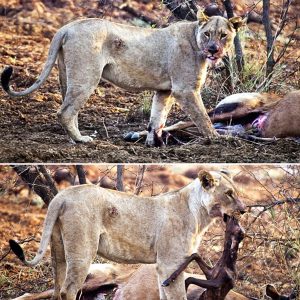They say what separates us from animals is our ability to reflect, to feel guilt, and to understand the consequences of our actions. But more and more, we’re learning that animals may not be so different from us after all — especially when it comes to compassion, sympathy, and emotional depth.

There are moments in nature that challenge everything we think we know about the animal kingdom. We tend to label animals as either predators or prey, following the cold, calculated laws of survival. Lions, for instance, are often viewed as the ultimate predator — the undisputed kings of the wild. They are known for their power, strength, and ruthless hunting skills. When we see them in action, it’s easy to assume they are purely instinct-driven creatures, without a hint of empathy or emotion.
But one moment in South Africa’s Madikwe Game Reserve changed that perception for a group of stunned safari-goers — and perhaps for the rest of us, too.
While exploring the reserve, the group came across a lioness who had just taken down a large antelope. It was a typical scene of nature’s brutal cycle — predator versus prey. The lioness had successfully hunted her target and began to devour it. But what happened next turned a seemingly ordinary event into something deeply emotional and unforgettable.
Shortly after beginning her meal, the lioness abruptly stopped. She had discovered something that gave her pause: the antelope she had hunted was pregnant. Inside the mother’s belly was an unborn fetus — a tiny, fragile life that hadn’t even taken its first breath.
And that’s when everything changed.
Instead of continuing to feed as one might expect, the lioness took a step back. She stopped eating. She gently removed the fetus from the mother’s body and placed it on the ground with remarkable care. She didn’t treat it as food. She didn’t treat it as a lifeless object. She treated it as something precious.
Gerry Van Der Walt, the safari guide leading the group, shared the incredible experience. “I’ve seen a lion kill where the prey was pregnant, but normally they would just carry on feeding as if nothing was wrong,” he said. “But this time, the scenes that followed had us all dumbstruck.”
Gerry went on to describe how the lioness delicately sniffed and examined the unborn antelope, as though trying to determine whether it was still alive. She didn’t act aggressively or dismissively. On the contrary, she appeared cautious, almost nervous, as if the tiny creature in front of her stirred feelings she herself didn’t fully understand.
“She very gently put the fetus on the floor,” Gerry recalled. “All the time she was looking around, clearly tense and uneasy. She nudged it softly with her nose, rolled it over, then picked it up by the back of the neck — just like a mother lion would carry one of her own cubs.”
This was no routine action. This was something far more complex — a moment of connection, of instinct meeting empathy.
Eventually, it seemed the lioness understood that the fetus was not alive. What she did next was even more astonishing: she carried it gently and hid it behind a bush, almost as if she were trying to give it a respectful place of rest — a burial of sorts. Then, instead of returning to feed, she lay down next to the lifeless body of the antelope. She did not eat. She simply stayed there, still, as though mourning.
“We watched as she carefully walked into the thicket,” Gerry continued. “She placed the fetus in the tall grass with such gentleness. She nudged it a few more times, all while constantly glancing around, as if waiting for help… or perhaps sensing danger.”
This wasn’t a typical feeding session. This was something deeper. The lioness’s behavior showed signs of sorrow, of hesitation, and yes — of remorse. She no longer saw the antelope as food. She seemed to view the situation through a different lens altogether.
For Gerry and the group, the experience was unlike anything they’d seen before. “This was definitely one of the most extraordinary moments of lion behavior I’ve ever witnessed,” Gerry said. “What was she thinking? Why did she react the way she did?”
The answer may never be certain, but it’s hard not to see the humanity in that moment. It’s hard not to believe that this lioness felt something — something beyond instinct, beyond survival. Perhaps it was guilt. Perhaps it was compassion. Perhaps it was a mix of emotions that even we, as humans, sometimes struggle to understand.
And maybe that’s the point.
For centuries, humans have drawn a clear line between ourselves and the rest of the animal world. We’ve claimed emotions like love, sorrow, and empathy as exclusively ours. But scenes like this remind us that those lines are not as solid as we think. Animals, too, are capable of emotional depth. They can show gentleness. They can mourn. They can act with compassion, even when the laws of nature demand otherwise.
This story is a powerful reminder of how incredible animals truly are. It challenges our assumptions and opens our eyes to a world that is far more emotionally intelligent than we often give it credit for.
So if you ever doubt that animals can feel, think again. Because in the heart of the African wilderness, a lioness put her meal on hold, showed tenderness to an unborn life, and acted in a way that moved a group of humans to tears.
That’s not just instinct. That’s heart.
Share this story if you believe animals feel more than we think.





